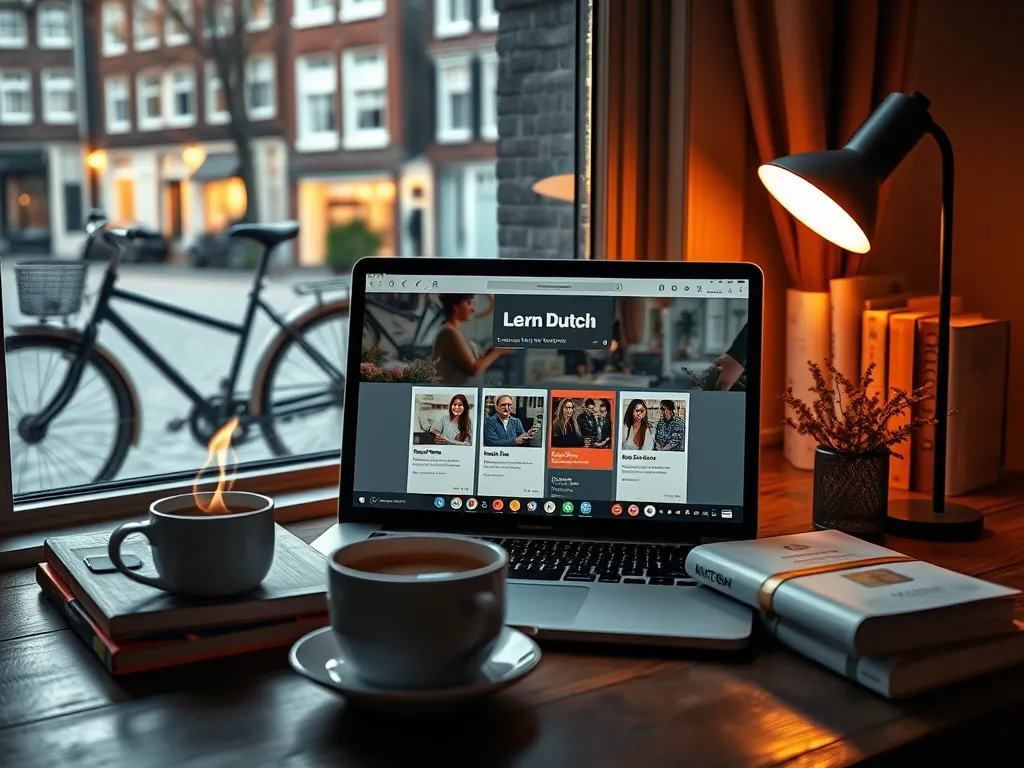Learn Amsterdam Dutch: Top Lessons & Online Courses

Learn Dutch in Amsterdam: Comprehensive Lessons & Courses
Amsterdam is not just the capital of the Netherlands; it’s also a vibrant hub for learning the Dutch language. With its diverse population and cultural richness, the city offers a variety of Amsterdam Dutch Lessons & Courses catering to different learning styles and levels. Whether you are a beginner looking to grasp the basics or an advanced learner aiming to polish your skills, Amsterdam has something for everyone.
In Amsterdam, Dutch lessons are available in various formats, from private tutoring to group classes, online sessions, and immersive programs. This variety ensures that learners can find the perfect fit for their needs and preferences. The city's thriving academic environment adds to the accessibility of quality language education, making it a prime location for those looking to enhance their Dutch proficiency.
Moreover, the city's cultural context enriches the language learning experience. Studying Dutch in Amsterdam allows learners to engage with the language in real-life scenarios, facilitating better understanding and retention. Furthermore, the opportunity to practice with native speakers and immerse oneself in local customs makes this city an ideal place to learn the language.
Cultural immersion is crucial when learning a new language, and Amsterdam’s dynamic atmosphere—filled with art, history, and multicultural experiences—provides ample opportunities to apply and practice the Dutch language. Whether through casual conversations with locals or participation in community events, language learners can significantly benefit from the cultural integration offered by this vibrant city.
In this article, we will explore the different types of Dutch lessons available in Amsterdam, online resources for learners, cultural aspects of learning in Amsterdam, practical tips for effective language learning, and the overall benefits of mastering the Dutch language.
Types of Dutch Lessons in Amsterdam
One predominant option for Dutch language learners is private tutoring. This personalized approach enables learners to focus on specific areas of difficulty, engage in one-on-one practice, and receive tailored feedback from experienced instructors. Private tutors can adapt their lessons to fit the student's goals and pace, making this an ideal choice for motivated learners seeking a more directed study experience.
Group classes are another popular choice for learning Dutch in Amsterdam. These classes offer a collaborative environment where learners can practice speaking, listening, reading, and writing together. Group classes typically provide a structured curriculum, ensuring that all essential language components are covered. They also foster a sense of community and support, which can be encouraging for language learners.
Online Dutch courses have gained popularity, especially for individuals with busy schedules or those who prefer self-paced learning. Many language schools in Amsterdam offer online classes that utilize modern technology and interactive tools. These courses often combine video lessons, quizzes, and live sessions to enhance the learning experience, making it convenient for learners both at home and on the go.
Discover how this innovative approach can revolutionize the way we think about sustainability and its impact on our planet in the detailed report #.
Dutch immersion programs are an excellent way to fully engage with the language in a short period. These programs combine language lessons with cultural experiences, allowing learners to practice their Dutch skills in real-world situations. Immersion experiences may include cultural outings, interaction with native speakers, and activities designed to reinforce language acquisition in natural settings.
Conversational practice sessions are essential for learners looking to improve their speaking and listening skills. These sessions typically involve guided conversations with either instructors or native speakers, focusing on practical language use. Conversational practice helps learners gain confidence in their speaking abilities and develop their fluency in everyday situations.
Resources for Learning Dutch Online
For those unable to attend traditional lessons, there are numerous online resources available for Dutch learners. Websites such as Duolingo, Babbel, and DutchPod101 provide interactive lessons and exercises designed to enhance vocabulary, grammar, and listening skills. These user-friendly platforms make learning accessible and engaging for individuals at any skill level.
Mobile apps are another valuable tool for learning Dutch on the go. Applications like Memrise and Drops offer vocabulary-building exercises and pronunciation practice through gamified experiences. These apps can be particularly useful for reinforcing concepts learned in class and accommodating busy schedules as they can be accessed anytime and anywhere.
YouTube channels dedicated to teaching Dutch are excellent for visual learners. Channels such as “Learn Dutch with Nienke” offer instructional videos, pronunciation tips, and real-life conversation examples. These resources provide learners with exposure to native speakers and various dialects, which enhances their understanding of pronunciation and real-world language use.
Podcasts are an increasingly popular option for learning Dutch while multitasking. Programs like “Dutch Today” and “Zeg het in het Nederlands” deliver conversations and cultural insights in Dutch, making them perfect for improving listening comprehension. Learners can listen during commutes or while exercising, allowing language study to seamlessly integrate into their daily routines.
Online dictionaries and translation tools, such as Google Translate and Reverso, serve as excellent resources for quick reference. These tools can assist in understanding new vocabulary, phrases, and grammar during the learning process. However, it is essential for learners to use these tools carefully to ensure they also develop their language skills without becoming overly reliant on translations.
Cultural Aspects of Learning Dutch in Amsterdam
Understanding the Dutch culture is paramount to mastering the language effectively. Language learners can enhance their fluency by exploring cultural topics such as Dutch history, customs, and traditions. Engaging with the culture provides a greater context for the language, facilitating a more profound comprehension and appreciation of its nuances.
Amsterdam boasts unique dialects and phrases that may not be encountered in standard language courses. Learning these local expressions and slang can significantly enrich a language learner's experience and enable them to communicate more authentically with residents. This real-world application helps build confidence and fosters relationships with native speakers.
Familiarity with famous Dutch authors and their works can also deepen a learner's connection with the language. Exploring literature allows learners to engage with the language's rich history and its nuances. Understanding cultural references embedded in texts can provide valuable context and enhance conversation skills.
Local customs are an essential aspect of Dutch culture. Language learners should be aware of social behaviors and etiquette, such as the significance of direct communication and the concept of 'gezelligheid'—a term used to describe a cozy, convivial atmosphere. Understanding these customs can aid in smoother interactions and help learners integrate into the local community more easily.
Attending events and workshops that expose learners to the local language environment can be an invaluable part of the language acquisition process. Many cultural institutions in Amsterdam offer activities geared towards language learners. These experiences create opportunities to interact with native speakers, enhancing language skills through social engagement and cultural immersion.
Tips for Effective Language Learning
Setting clear and achievable language learning goals is vital for making consistent progress. Whether aiming to learn a certain number of vocabulary words each week or striving to hold a conversation, having specific goals can guide learners and enhance their motivation.
Practicing speaking and listening skills regularly is crucial in mastering the Dutch language. Engaging in conversations with native speakers or fellow learners fosters real-world application of the language and builds confidence in speaking abilities. The more learners immerse themselves in conversation, the easier it becomes to think and respond in Dutch.
Using flashcards for vocabulary retention can significantly enhance a learner's ability to memorize new words and phrases. Flashcards allow for quick review and can be made into a game to make the learning experience more enjoyable. This technique is especially useful for visual learners and helps reinforce vocabulary recall.
Finding language exchange partners can be an effective way to practice speaking & listening skills while making new friends. Language exchange involves pairing with a native Dutch speaker who wants to learn your language. This mutually beneficial arrangement enables learners to practice their skills in real conversations, improving fluency and building cultural connections.
Tracking progress in learning Dutch through journals or language learning apps can provide learners with a sense of accomplishment. Keeping a record of achievements, challenges, and improvements can motivate learners to persist in their studies and celebrate their language learning milestones.
Benefits of Learning Dutch
Mastering the Dutch language opens up a wealth of career opportunities in the Netherlands and internationally. As companies continue to expand their reach, bilingual employees who can communicate with Dutch clients or partners are increasingly in demand. Proficiency in Dutch can also enhance job prospects within the expat community.
Enhancing travel experiences in the Netherlands becomes significantly easier for proficient Dutch speakers. Understanding the language allows for deeper engagement with the culture, historical sites, and local customs, creating a richer travel experience in this beautiful country.
Making local friends in Amsterdam is facilitated by a solid understanding of the Dutch language. Building relationships and connections with Dutch speakers is easier when the language barrier is minimized. This opens up a world of social opportunities and community involvement.
Gaining access to Dutch media, including films, music, and literature, allows learners to immerse themselves further in the language and culture. Enjoying media in its original form adds an extra layer of understanding and appreciation of the language's rhythm and nuances.
Lastly, the cognitive benefits of bilingualism are well-documented. Studies indicate that learning a second language can enhance problem-solving skills, creativity, and memory. Bilingual individuals often display stronger multitasking abilities and improved cognitive flexibility, making language learning a valuable investment in one's personal and professional life.
Name: Amsterdam Dutch Lessons & Courses | Language Learn Online
Website: https://languagelearnonline.com/
Addresss: Herengracht 420, 1017 BZ Amsterdam, Netherlands
Phone: +31629462538
